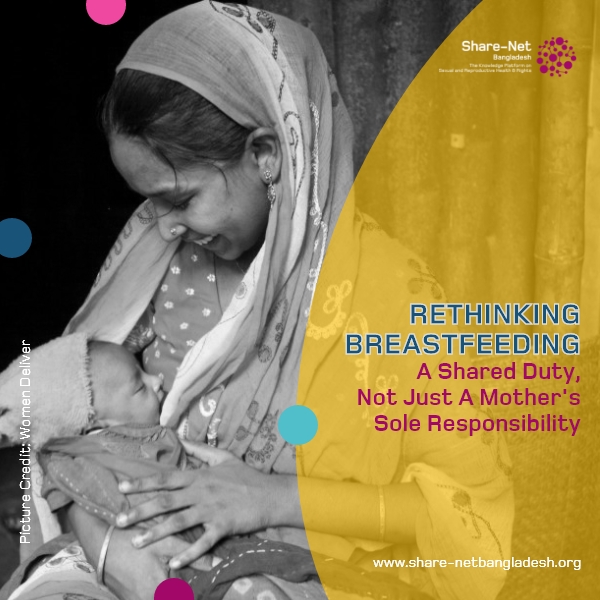Rethinking Breastfeeding: A Shared Duty, Not Just a Mother’s Sole Responsibility
“Breastfeeding can save 823,000 children under five and 20,000 women from breast cancer each year,” reports The Lancet. Yet, despite this compelling evidence, only 37% of children under six months in low- and middle-income countries are exclusively breastfed. In Bangladesh, this rate, once at 55%, is now in decline, as indicated by the Bangladesh Demographic Health Survey 2022. These statistics highlight a pressing issue: the societal and systemic barriers to breastfeeding.
Motherhood is a transformative experience, bringing both joy and overwhelming responsibility. From the moment a child is born, feeding becomes the mother’s primary duty. Public health experts advocate for early initiation of breastfeeding, exclusive breastfeeding for the first six months, and continued breastfeeding until the child is two years old or beyond. The benefits are clear: protection against infections, increased intelligence, and reduced risks of obesity and diabetes in children. For mothers, breastfeeding reduces the risk of breast cancer, ovarian cancer, and diabetes.
However, breastfeeding is not solely a mother’s responsibility. It is a collective duty involving families, workplaces, and society. In Bangladesh, societal support for breastfeeding remains inadequate. Families often lack the understanding and resources to support breastfeeding mothers, leaving them isolated and overwhelmed. A facility-based study by icddr,b revealed that a 24-year-old mother suffered from severe sleep deprivation and mental health issues due to the lack of support, leading her to consider discontinuing breastfeeding.
Cultural, medical, and personal choices also influence breastfeeding practices. The global marketing of commercial milk formula (CMF) presents significant challenges. The CMF industry, which profits approximately $55 billion annually, often undermines breastfeeding efforts despite legal measures.
Bangladesh has implemented regulations to curb the promotion of breast milk substitutes, yet gaps in enforcement persist. Educating healthcare professionals and the public about the benefits of breastfeeding and dispelling myths about milk insufficiency are crucial steps toward improvement.
Workplace support for breastfeeding is equally vital. After maternity leave, many women return to work, facing separation anxiety and physical discomfort from engorgement if unable to express milk regularly. Although the High Court of Bangladesh directed the establishment of nursing corners in workplaces and public areas in 2019, implementation remains sparse. Creating breastfeeding-friendly environments in offices, shopping malls, airports, bus stops, and railway stations is essential.
Public awareness and support during World Breastfeeding Week, observed annually in August, are pivotal. This year’s theme, “Closing the Gap: Breastfeeding Support for All,” emphasizes reducing inequalities and enhancing support for breastfeeding. By prioritizing breastfeeding in sexual and reproductive health and rights (SRHR) agendas, we align with the Sustainable Development Goals (SDGs), particularly those related to health, gender equality, and well-being.
Breastfeeding must be recognized as a collective responsibility. Families, employers, and policymakers all play a role in supporting breastfeeding mothers. Providing physical and emotional support, creating conducive environments, and enforcing regulations are steps toward empowering women to breastfeed successfully.
Let us extend that spirit to ensure every mother receives the support she needs. Together, we can create a society where breastfeeding is not just a mother’s duty but a shared commitment to health and well-being.
Source: Dhaka Tribune
Picture Credit:

